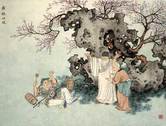Stories about exemplary filial conduct abound in Chinese history. The Twenty-Four Examples of Filial Piety were chosen and compiled by Guo Jujing from the Fujian Province during the Yuan Dynasty (1280-1368 CE) while he was mourning the death of his father. He recounted the feats of filial children towards their parents from the age of the primordial Emperor Shun down to his own era. Even today, these stories form an important part of orthodox Chinese virtue.
 |
During the Spring and Autumn period there lived a filial son named Old Master Lai (Lao Laizi). From his youth he had always been most respectful and obedient towards his parents. He obeyed their wishes, and even took special care of their innermost thoughts, so concerned was his heart about serving them as a dutiful son. At seventy he still earnestly made offerings to the elderly couple, who had reached such a lengthy life span due to his filial devotion. He kept them warm in winter, cool in summer, and fed them soft foods that were easy to digest in their toothless mouths.
Old Master Lai, wanting to keep his parents’ spirits high, never mentioned the word “old” in their hearing. One day he overheard his parents lamenting, “Look at our son, he’s already in his dotage! Surely our own days must be drawing to a close!” When he heard that, his heart could not endure the helpless feelings that arose. “I must find a way to lighten their hearts!” he vowed. Determined to keep his parents from lamenting over their increasing years, he hit upon a plan.
Old Master Lai dressed up in the costume of a young child at the circus or imitate the walk and manner of a mischievous boy at play. He would paint on comic opera make-up and carry a flower drum, horse-playing and cutting comic antics in front of his delighted parents’ eyes.
To tickle their funny bone he would take a toy in hand and mimic a child’s nonsense prattle, singing and dancing, and falling in a heap. Sometimes he would carry a pole into the sitting room that balanced two full buckets of water. Singing a silly tune he would trip up on purpose, sending water showering over the floor and soaking his foolish-looking wig and facial powder. His ridiculous show never failed to send the old folks into gales of laughter. Playing the fool always dispelled his elders’ periods of melancholy and made them happy for days. Even though he was not a youngster, he was able to dutifully care for the physical health and mental well-being of his seniors. This was his first priority in life.
Lao Laizi’s filial devotion impressed all who heard of it, and he received unreserved praise as an unusual example of perfect respect and proper affect ion.
A verse in his honour says,
He cut a comic caper, and played the merry fool,
The Spring breeze fluttered his flower-drum gown.
The old folks laughed with toothless glee;
The sounds of their delight filled the air with joy.
* * *
You are welcome to print and circulate all articles published on Clearharmony and their content, but please quote the source.










 more ...
more ...